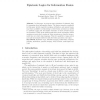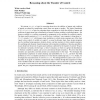35 search results - page 5 / 7 » Extending a Defeasible Reasoner with Modal and Deontic Logic... |
ECSQARU
2003
Springer
13 years 10 months ago
2003
Springer
In this paper, we propose some extensions of epistemic logic for reasoning about information fusion. The fusion operators considered in this paper include majority merging, arbitra...
IWFM
2003
13 years 7 months ago
2003
We outline a possible logic that will allow us to give a unified approach to reasoning about computational effects. The logic is given by extending Moggi’s computational λ-cal...
JAIR
2010
13 years 4 months ago
2010
We present DCL-PC: a logic for reasoning about how the abilities of agents and coalitions of agents are altered by transferring control from one agent to another. The logical foun...
CSL
1999
Springer
13 years 10 months ago
1999
Springer
Hybrid languages are extended modal languages which can refer to (or even quantify over) states. Such languages are better behaved proof theoretically than ordinary modal languages...
SLP
1994
13 years 7 months ago
1994
We consider a hierarchy of modal event calculi to represent and reason about partially ordered events. These calculi are based on the model of time and change of Kowalski and Sergo...


